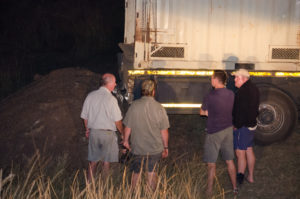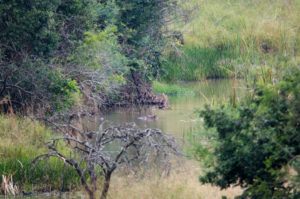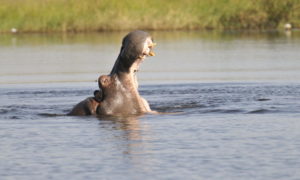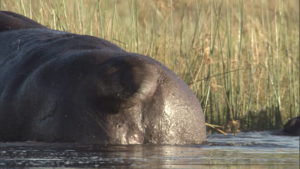It has been just under a month since the release of the first four hippo on Nhlamvini Game Reserve. It has been great to watch them settle in and find their feet and already there are some interesting developments.

Release night of the 4 Hippo
Four Hippos were trans-located from the Sabi Sands to Nhlamvini Game Reserve in April. They consisted of 2 sub- adult males and 2 sub- adult females. All four Hippos were released in the same dam during night and were left to explore their new home. Within a day of the release they had decided to move up to “Avas Dam’ just up the valley. This is one of the new dams constructed, but the hippos seemed to feel quite at home. A week later, one bull and the two females moved back down to the release dam and the other bull stayed up in ‘Avas dam’. Sexual maturity in Hippos take place at about 3 years for the cows and between 4 and 7 years for the bulls. The situation we have here is that there is no other dominant bulls on the reserve and these young bulls will be able to establish themselves much sooner than if there were other competing bulls and it seems we have a winner! It could be that the other bull could still be allowed back into the pod, but only if he remains submissive to the now dominant bull and does not try to mate with the females. The two females should be sexually mature within the next year and then tension will definitely rise.

We watched the two young females explore their new home. Plenty of playing and vocalizing! They still seem slightly nervous when humans are in the area but they are definitely starting to relax and enjoy their new home.
Hippo cows calf through out the year! They have a gestation period of about 8 months and gives birth to one calf at a time. So a hypothetical calculation; if a female hippo becomes sexually mature at the age of 3 and calves every third year after her first baby is born when she is 4 years old, then one breeding couple could theoretically produce 24- 38 hippo (of 6 generations) in 20 years. This is quite an impressive rate when looking at it like this.
With the new additions on the reserve, it has been great to watch them settle in and the iconic  call of the hippo has been a wonderful sound to now hear echoing through the valley. If you are around a group of Hippos, you will hear them vocalizing as a way to communicate with each other. There is a great deal we still need to learn in regards to what these sounds mean though. Bellows and deep grunts can be heard, and they are more common when they are looking to mate. It is possible that they use echolocation just like dolphins but there isn’t’ enough evidence in place yet to substantiate such claims. Due to the highly aggressive nature of Hippos it is very hard to observe their social structure and communicating in depth in the wild. A unique ability that Hippos have though is to hold their head above the water part way. Then they can make sounds that are able to travel both through the land and through the air. This is an amazing ability and can help to get messages sent to those Hippos that are quite a distance away from them.
call of the hippo has been a wonderful sound to now hear echoing through the valley. If you are around a group of Hippos, you will hear them vocalizing as a way to communicate with each other. There is a great deal we still need to learn in regards to what these sounds mean though. Bellows and deep grunts can be heard, and they are more common when they are looking to mate. It is possible that they use echolocation just like dolphins but there isn’t’ enough evidence in place yet to substantiate such claims. Due to the highly aggressive nature of Hippos it is very hard to observe their social structure and communicating in depth in the wild. A unique ability that Hippos have though is to hold their head above the water part way. Then they can make sounds that are able to travel both through the land and through the air. This is an amazing ability and can help to get messages sent to those Hippos that are quite a distance away from them.
When it comes to communication, the dominant bull Hippo uses a specific form of communication to mark his territory and spread his scent. He does this by scattering his dung with his tail. As they are spinning around in the water they will lift up the tail. Then they will defecate or urinate backwards to cover the biggest area that they can. They will also do this when they are out of the water and feeding in their preferred grazing areas. This story always brings to mind a folklore story about the hippo:
“When God was giving each animal a place in the world, the pair of hippos begged to be allowed to live in the cool water which they so dearly loved.
God looked at them, and was doubtful about letting them live in the water: their mouths were so large, their teeth so long and sharp, and their size and their appetites were so big, He was afraid that they would eat up all the fish. Besides, He had already granted the place to another predator – the crocodile. He couldn’t have two kinds of large, hungry animals living in the rivers. So God refused the hippos’ request, and told them that they could live out on the open plains.At this news, the two hippos began to weep and wail, making the most awful noise. They pleaded and pleaded with God, who finally gave in. But He made the hippos promise that if they lived in the rivers, they must never harm a single fish. They were to eat grass instead. The Hippos promised solemnly, and rushed to the river, grunting with delight.
And to this day, hippos always scatter their dung on the river bank, so God can see that it contains no fish bones. And you can still hear them laughing with joy that they were allowed to live in the rivers after all. ”
( From: When the Hippos was Hairy and Other Tales from Africa: Nick Greaves)
Hippo Bull marking his territory
The hippos have been a great addition to the reserve and we look forward to watching their progress in the next few months. Be sure to keep an eye on our facebook page for more pictures and updates as the story unfolds.

